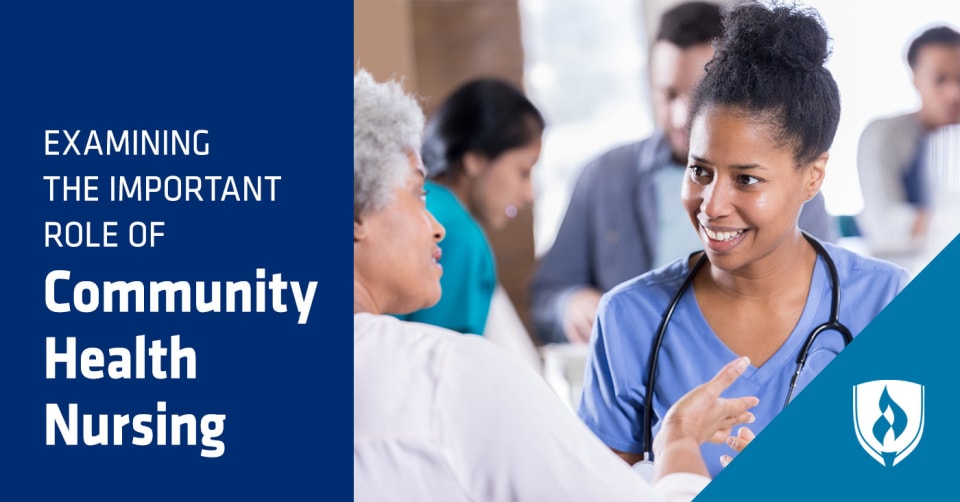
Communities have relied on nurses for hundreds of years. During serious illness, injury, or labor and delivery, the medical knowledge and compassionate patient care performed by nurses is vital. Because of their huge impact on people’s lives, our depiction of nurses can grow almost mythic. For instance, Civil War–era nurse and founder of the American Red Cross, Clara Barton, was known as “the angel of the battlefield.”
Yet our understanding of how to provide healthcare has evolved since the role of a nurse became standard in every hospital setting. Healthcare providers have begun to look beyond the medical care of an individual to how the overall health and safety of a community can lead to less disease, longer life expectancies, and fewer injuries.
Many nurses have stepped into key roles in this effort. Community health nurses, also known as public health nurses, work to improve the health of a population and reduce disease and disability. This holistic approach to healthcare draws on knowledge of nursing, social sciences, and public health. Let’s take a deeper look at this powerful role within the healthcare system and what educational background community health nurses need to make an impact.
Get Your Nursing School Questions Answered at a Nursing Information Session
What is a community health nurse?
Medical practice in the United States has historically been centered on the treatment of illness. When people fall ill or become injured, the healthcare system intervenes to restore a patient’s good health. It’s ingrained in our brains—when you’re sick, you go to the doctor.
This model of healthcare is fundamentally reactive. More recently, healthcare providers and social scientists began to think about a healthcare system that could work proactively. What if the medical crises that doctors and nurses respond to could be avoided in the first place? What are the root causes of disease and disability within a population and how do we weed them out?
In the early 2000s, several books and journal articles were written about the social determinants of health and infectious disease. Low levels of education, belonging to marginalized communities, and symptoms of poverty were found to be a bigger risk factor for poor health outcomes than limited access to care or genetic predispositions toward illness. While addressing these often interconnected issues is a certainly a tall task, it’s clear a holistic approach to healthcare is needed to make progress.
Enter the community health nurse, a profession that works to improve many individuals’ health by doing what they can to reduce social and environmental determinants of illness within a community. Community health nurses work in advocacy, policy development and planning. They advance principles of social justice specifically in order to improve health outcomes for all.
Where do community health nurses work?
Community health nurses work in many different locations with many different populations. Depending on where they work, community health nurses might have more or less direct contact with individual members of the community. Here are 5 examples of organizations and facilities that rely on community health nurses:1
1. Community health centers
In this setting, a community health nurse may work directly with members of the community to address their medical needs. Additionally, community health nurses develop educational campaigns and resources around relevant topics such as family planning, sexual health and other preventative care. Community health nurses might work outside the community health center itself in order to have more contact with a wider cross section of the community.
2. Correctional facilities
A correctional facility is an environment where many people are housed in close proximity. Here, community health nurses often work to limit the spread of communicable disease. They run educational programs for inmates and staff, implement infectious disease control protocols, and work closely with state and local health departments.
3. Schools
In schools, community health nurses are able to provide education around illness prevention and good health habits. Children with access to this information are able to lead longer and healthier lives. Community health nurses in schools may also help children manage existing health problems and intervene if children are experiencing abuse or neglect.
4. Aid organizations
Many community health nurses work for organizations such as the Red Cross or Doctors Without Borders. These nurses often work with disaster relief, access to safe drinking water, and how to prevent infectious disease along with other local needs similar to the work at any community health center.
5. Government agencies
Community health nurses working with government agencies often have little direct medical work with members of their community. Instead, they work on policy development and implementation to create change on a large scale for many different populations.
What are some common responsibilities of a community health nurse?
The scope of practice for a community health nurse includes community-building, health promotion, and policy reforms that promote the health of a population. Because they have such a broad scope of work, the responsibilities of a community health nurse vary depending on where they work and the needs of their community. Some community health nurses provide standard medical care such as immunizations, screenings or medication, while they may also work on developing and implementing educational programs, research around social and environmental determinants of health outcomes, and advocacy.
How do you become a community health nurse?
When compared with some registered nursing roles, becoming a community health nurse typically requires some additional training and educational experience. A community health nurse needs to have a strong background in nursing as well as an understanding of social science and public policy.
Education requirements
At a very minimum, aspiring community health nurses will need to earn an Associate’s Degree in Nursing (ADN) and pass the NCLEX-RN exam, but it should be noted that many employers may prefer candidates with a Bachelor of Science in Nursing.1 Our analysis of 2,173 community health nurse job postings found that 61 percent of positions required a BSN at a minimum.1 Additionally, community health nurses may want to consider earning a Master’s degree in Public Health or a related field.
The many faces of nursing
The field of nursing is incredibly dynamic. If you are interested in thinking about healthcare in a new way, implementing systemic change, or building stronger communities with longer life expectancies and better health outcomes, community health nursing could be a specialty to explore further. Many other specialties bring nurses into communities and settings outside a traditional hospital. Learn more about the many different places nurses work in our article, “Where Do Registered Nurses Work? 11 Places You Didn't Know About.”
1Burning-Glass.com (analysis of 2,173 community health nursing job postings, December 1, 2018 – November 30, 2019)




